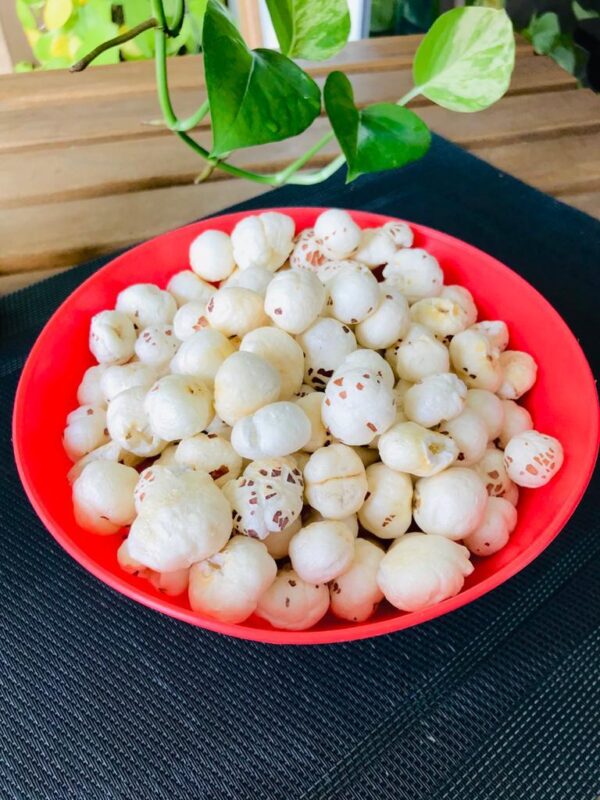Blog
How many makhana eat a day?

Understanding the Nutritional Value of Makhana:
To reveal what role makhana plays in a balanced diet, you should look at what nutrients it provides. Makhana is unique in that it is not high in calories and gives a chance to those who want to manage their weight and still enjoy the flavor and feeling of fulfillment. A regular 100 grams’ serving of makhana has only about 350 calories, so it’s a perfect snack for those who would like to watch their weight.
Moreover, makhana is a great source of protein, containing about 9 grams per serving. This protein content is most important for vegans and vegetarians because it gives them an opportunity to have protein sources consumed from animals. On the other hand, makhana is high in carbohydrates which provide energy very fast and long and also do not let the blood sugar rise quickly.
As well as macronutrients, makhana has micronutrients like magnesium, potassium and phosphorus which are all essential for the body to function properly. These minerals help with multiple things, among them being nerve activity and muscle contraction, or bone health and how our bodies use energy. Moreover, makhana contains several antioxidants – flavonoids and saponins – which relieve oxidative stress and inflammation and help overall health and wellness as well.
Health Benefits of Makhana:
Eating makhana has a myriad of health advantages and therefore it is always a good idea to include it in your diet. One of the best things about adding makhana to your diet is that it:
1. Weight Management: Makhana is the perfect snack for those who want to lose or keep their weight in check as it has a low calorie count and high protein levels. One of the main benefits of makhana is that it makes you feel full and satisfied, as a result you are able to control your cravings and consume fewer calories, which in turn makes it easier to lose weight and keep it at a bay.
2. Heart Health: Makhana has low levels of cholesterol and sodium which are good for your cardiovascular system. Moreover, the potassium in it can regulate blood pressure which subsequently reduces the probability of hypertension and heart disease. By strengthening the heart, makhana makes overall health better and longer life,too.
3. Digestive Health: The presence of dietary fiber in makhana makes it healthy for your digestive system as it helps you maintain regular bowel movements and prevent constipation. The fiber ensures that the digestive system remains full which aids in the smoother digestion process and better absorption of nutrients. Through maintaining a well health gut, makhana assists the digestive system work properly and feel better overall.
- Blood Sugar Regulation: The slow-release of glucose into the system, as a result of the low glycemic index of Makhana, makes sure that blood sugar levels rise gradually, not quickly. This constant energy supply maintains blood sugar levels stable, which reduces the risk of insulin resistance and type 2 diabetes. Through the support of stable blood sugar balance, makhana contributes to the betterment of metabolic health and reduces the likelihood of diabetes related complications thus.
- Bone Health: Calcium in makhana help in making bones stronger and denser, which protects against osteoporosis and bone injuries. These nutrients are particularly vital for building bones, remolding bones, and maintaining healthy bones at all ages. Improves the strength of bones and teeth thereby strengthens the health and mobility of the musculoskeletal system.
- Antioxidant Properties: Makhana is rich in many antioxidants, like flavonoids, phenols, and saponins that counter free radicals and oxidative stress. By blocking oxidative damage at the cellular level, makhana stabilizes the risk of developing chronic conditions such as cancer, heart disease and neurodegenerative disorders in the long term. Antioxidants not only battle the free radicals and keep the skin looking beautiful, they also are good for your skin and well-being in general.
How Much Makhana Should You Eat Every Day?
Makhana has numerous nutritional benefits, but it is also very important to do them in moderation to get the maximum results from it without any complications. The daily dosage of makhana for an individual is dependent on his age, gender, exercise level, and the overall eating habits. But here are some general rules that can help you figure out how much makhana to drink:
1. Portion Control: Just like any other snack, makhana should also be eaten in a limited amount. A makhana serving is about 25 to 30 grams, which is approximately the same as a handful or a cup of it. If you watch your portions, makhana can still be enjoyed as a snack without having to exceed your daily calorie limit or wrecking your diet plans.
2. Balanced Diet Integration: Makhana should be taken along with a balanced and comprehensive diet which involves many other healthy foods. While makhan has a lot of healthy properties, it is still important to eat a variety of foods in addition to it, such as fruits, vegetables, whole grains, lean proteins, and healthy fats. A diet with a variety of foods is a good way to ensure you have adequate intake of the nutrients your body needs and improve your overall nutritional status.
3. Mindful Eating Practices: To be aware of your body’s signals while eating makhana, notice your body’s cues of hunger and fullness, eat slowly, and savor each bite. By bringing your attention to what you eat you will stop on mindless snacking and eating more calories you don’t need. With this you will have a good food relationship and learn how to eat intuitively.
4. Individualized Considerations: While selecting the makhana amount, take into account your dietary requirements, preferences and health objectives. Consult with a registered dietitian or other health care provider for specialized guidance if you have specific dietary requirements, food allergies, or existing health problems. They can give you customized recommendations based on your specific needs, thus including makhana in all parts of your meals.
5. Culinary Exploration: Experiment with different ways of cooking makhana, mixing flavors, and offer this idea. Makhana can be eaten as it is, but you can enhance its taste and comfort level by adding various spices, herbs, and methods of cooking. You can roast, toast or air-fry makhana to make a crunchy and satisfying snack or raise its nutritional value by adding it to salads, stews and trail mixes. You can relish the makhana in different dishes by experimenting with various cuisines. This, in turn, will make it healthier and tastier to your tongue.
In conclusion:
Makhana is a nutritional powerhouse which is packed with many health benefits that cater not only for your overall health but also for your vitality. Makhana is an awesome tool that can help you achieve your weight loss goals and better your health status. Whether you’re looking to lose some weight, control your blood sugar levels, lower your cholesterol, or just enjoy a healthy snack, makhana is the perfect option for everybody. Gradually and cautiously, you can make better food selections by including makhana in your daily meals. Hence, have makhanas and you will be affirmative that each bite is bringing you a step closer to a healthy and happier life.
Here are 10 frequently asked questions on the topic How many makhana eat a day?
Q1: How many Makhana should one ideally eat in a day?
A1: The ideal number of Makhana to consume in a day can vary based on individual dietary needs and goals. However, a small portion, such as a handful (approximately 20-25 grams), is a common serving size for most people.
Q2: Can the quantity of Makhana consumption vary based on age and health conditions?
A2: Yes, the quantity of Makhana one can consume might vary based on age, health conditions, and dietary requirements. It’s advisable to consult a healthcare provider or a nutritionist for personalized recommendations.
Q3: Is it safe to eat Makhana daily?
A3: Yes, Makhana is generally safe to eat daily. They are low in calories and fat, making them a healthy snack option. However, moderation is key to maintaining a balanced diet.
Q4: Can Makhana be a suitable snack for weight management?
A4: Yes, Makhana is a suitable snack for weight management as it is low in calories, fat, and cholesterol. Its high fiber content can also help in promoting a feeling of fullness.
Q5: Should the quantity of Makhana be adjusted based on physical activity levels?
A5: Yes, individuals with higher physical activity levels might need more calories and can adjust their Makhana intake accordingly to meet their energy needs.
Q6: Can Makhana be consumed by children as a healthy snack?
A6: Yes, Makhana is a healthy snack option for children. They are easy to chew and are a source of essential nutrients. However, parents should ensure that it doesn’t replace a balanced diet.
Q7: Are there any specific health benefits associated with consuming a moderate amount of Makhana daily?
A7: Yes, Makhana is a good source of protein, calcium, iron, and antioxidants. Consuming them in moderation can support bone health, provide energy, and contribute to overall well-being.
Q8: Can Makhana consumption be beneficial for individuals with dietary restrictions such as vegetarians and vegans?
A8: Yes, Makhana is a plant-based food and is suitable for individuals following vegetarian and vegan diets. It provides a good protein source without animal products.
Q9: Can Makhana be flavored and consumed as a tasty snack?
A9: Yes, Makhana can be flavored in various ways, making them a delicious snack option. Common flavors include salted, spicy, and sweet, catering to different tastes.
Q10: Are there any side effects associated with excessive Makhana consumption?
A10: Excessive consumption of Makhana might lead to an imbalance in the diet. It’s important to maintain a varied diet and not rely solely on one type of food. Also, excessive seasoning (like too much salt) should be avoided for health reasons.**













